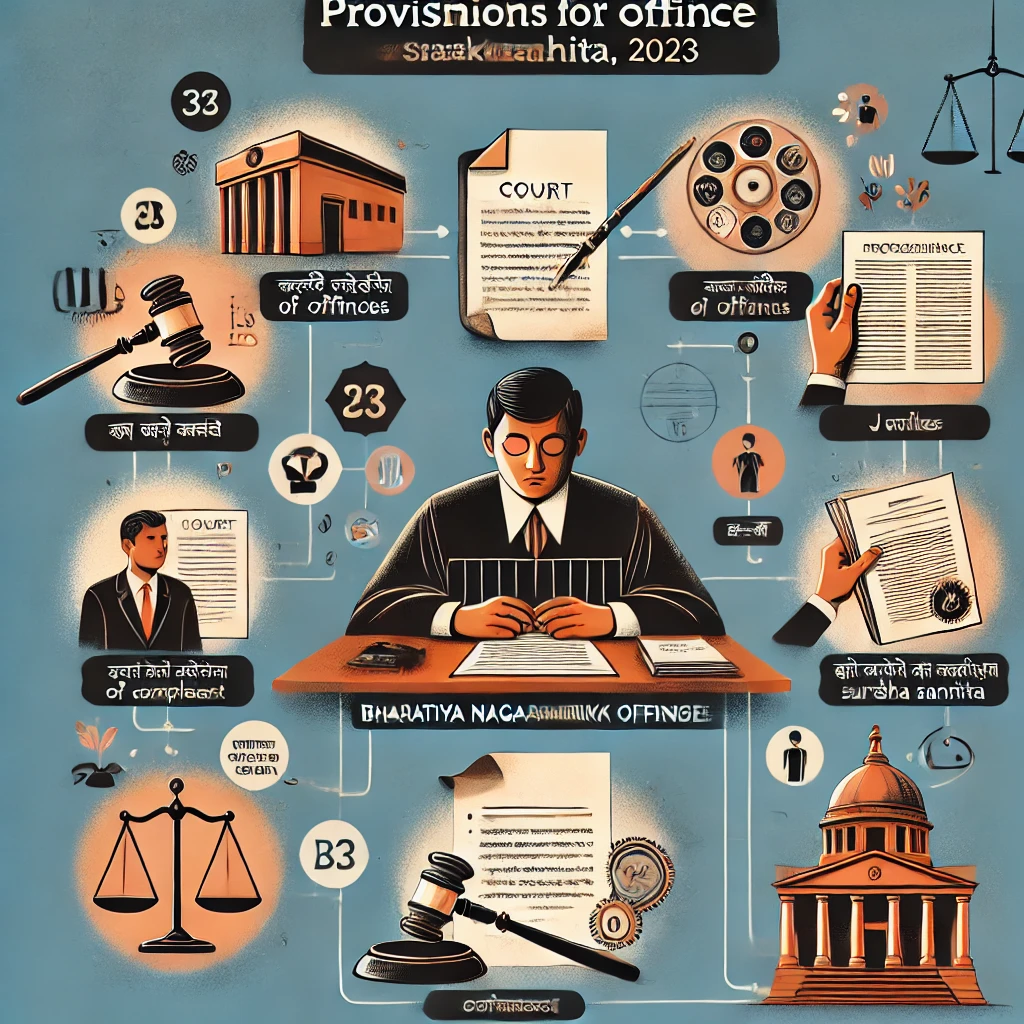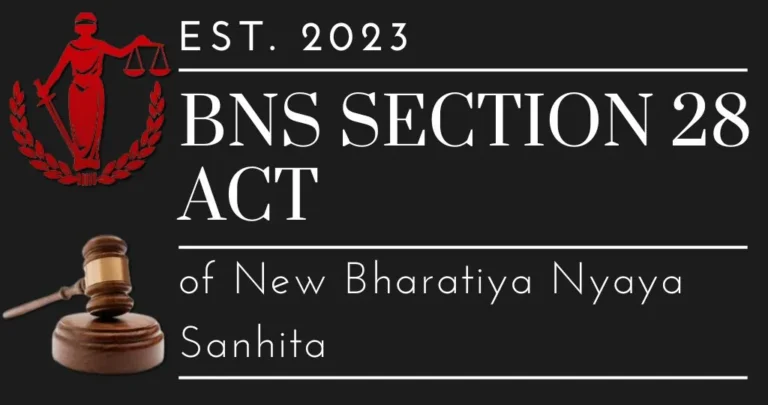
Provisions for Cognizance of Offences by Courts under Bharatiya Nagarik Suraksha Sanhita, 2023
Provisions for Cognizance of Offences by Courts under Bharatiya Nagarik Suraksha Sanhita, 2023
The Bharatiya Nagarik Suraksha Sanhita, 2023 (BNSS) has substituted the Criminal Procedure Code and came into force from July 1, 2024. One of the most important features of this new legislation is the manner in which courts can take cognizance of certain offences. “Cognizance” in this context refers to the court becoming aware of an offence and agreeing to pursue a case. Chapter XV of the BNSS sets out particular provisions regarding when and how a court may initiate proceedings for offences. Section 215 sets out the circumstances under which courts may take cognizance of offences, particularly when judicial matters and public servants are involved.
Section 215: Restrictions on Taking Cognizance by Courts
For More Updates & Regular Notes Join Our Whats App Group (https://chat.whatsapp.com/DkucckgAEJbCtXwXr2yIt0) and Telegram Group ( https://t.me/legalmaestroeducators ) contact@legalmaestros.com.
Sub-section (1): No Court Shall Take Cognizance without a Complaint from Authorized Personnel
Section 215(1) prescribes particular types of offences for which the courts cannot take cognizance except upon a written complaint made by or on behalf of the authorized personnel. Such offences are those that have been committed by public servants, offences committed in the course of judicial proceedings, etc. The section also prescribes that complaints must be made either by the public servant to whom the offence is committed, another public servant authorized by him, or an officer of the court.
For More Updates & Regular Notes Join Our Whats App Group (https://chat.whatsapp.com/DkucckgAEJbCtXwXr2yIt0) and Telegram Group ( https://t.me/legalmaestroeducators )
Key Provisions:
Offences committed by Public Servants (Sections 206 to 223 of BNSS) In respect of offences which are punishable under sections 206 to 223 (except section 209) of the Bharatiya Nyaya Sanhita, no court can take cognizance unless there is a written complaint filed by the concerned public servant or some other authorized public servant. This provision applies also to abetment (to the support or assistance in the commission of the offence), attempt, or conspiracy to commit such offences.
Example: If a public servant, while on duty, commits an offence like misappropriation of public property (under section 208), a court can only start proceedings if the affected public servant or their superior lodges a formal complaint.
Offences in Connection with Judicial Proceedings Offences against court proceedings, including giving false evidence (sections 229 to 233, 236, 237, 242 to 248, and 267), cannot be taken cognizance of by the court without a written complaint by the court wherein the offence has occurred or by a court to which the former is subordinate.
Example: If one produces a forged document in court (section 229), the court will not take cognizance unless the judge or some other court officer makes a written complaint.
Offences Relating to Documents or Evidence This provision extends to include cases where an offence (such as forgery) relates to a document that is produced in court. Such cases are also subject to the requirement of a complaint in writing by a proper court officer.
Example: Where an individual tampers with a legal document and presents it as evidence, proceedings can only commence in the court if the judicially presiding officer or any other authorized official files a formal complaint.
Sub-section (2): Withdrawal of Complaints by Public Authorities
This section gives public servants, who have already lodged a complaint, the option to withdraw their complaint. Nevertheless, this must be sanctioned by the authority in which the public servant is under administrative supervision. Once the complaint has been withdrawn, the case cannot proceed with the court. But, withdrawal is only available if the trial has not already been concluded before the court of first instance.
Illustration: Suppose a complaint was registered against a government official for embezzlement of funds but the government department subsequently withdraws the complaint before the trial is over, the court will not be able to proceed with the case.
Sub-section (3): Definition of “Court”
Section 215(3) of the Indian Penal Code specifies the term “court” to mean civil, revenue, or criminal courts, and tribunals which are created under Central or State laws and notified to be a court under this section.
Illustration: A revenue tribunal dealing with land cases may qualify as a “court” under this section, thus, offences against court proceedings in such a tribunal also need a formal complaint to initiate proceedings.
Sub-section (4): Determining Courts’ Subordination
This section makes it clear which court is subordinate to another for the purposes of preferring complaints. A court is subordinate to the court where appeals generally lie. Where the decisions of a civil court are not appealable, the original civil jurisdiction court will be deemed the superior court. Where appeals lie with both civil and revenue courts, the nature of the court (civil or revenue) will decide whether it is subordinate.
For example, a subordinate district court whose orders are commonly appealed in the high court shall be deemed under the control of the high court. Likewise, a revenue court that deals with land disputes will be under the control of the civil court where the case concerns the ownership of land.
Conclusion
The Bharatiya Nagarik Suraksha Sanhita, 2023 achieves specific clarity into the provisions about the manner of cognizance taken by the courts, more specifically public servant and judicial court offences. Section 215 provides the condition that courts cannot take cognizance of certain offences in the absence of a complaint made formally by an authorized public official or court officer. Further provisions for withdrawal of complaints make sure that cases are handled effectively, and the liberal definition of courts makes judicial administration flexible. These regulations are designed to preserve the integrity of judicial and public offices so that only persons who are authorized can open proceedings in sensitive cases.






